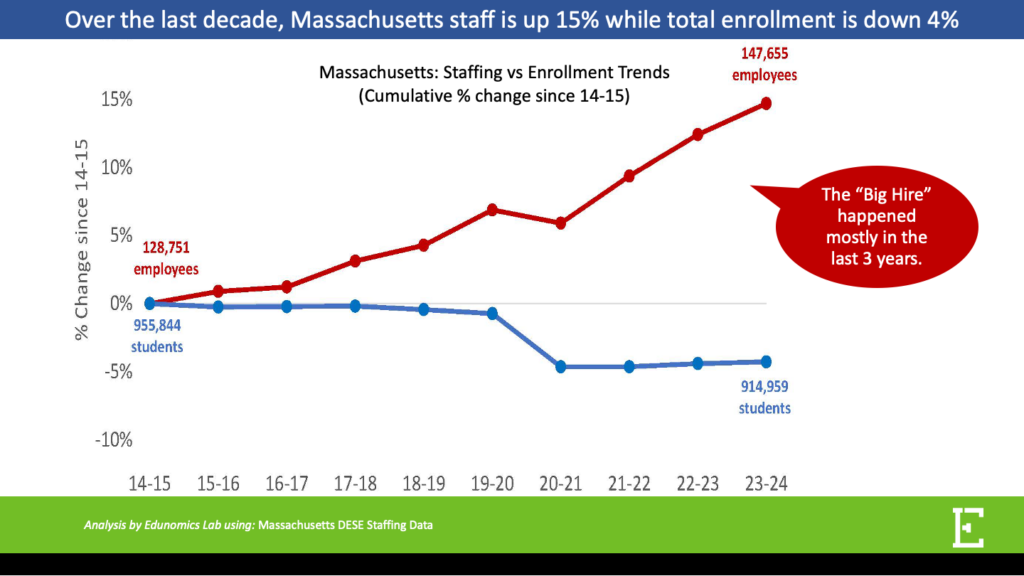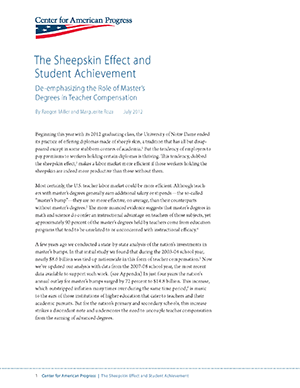30-Min Webinar: The Big Hire: Massachusetts’s school staffing changes

In this 30-minute webinar, we share findings from a new Edunomics Lab analysis of how staffing has changed in Massachusetts schools between 2020 and 2024.
30-Min Webinar: Districts now have more staff than ever. And fewer students. What happens next?

With the end of ESSER looming, and tighter state budgets, districts know they can’t afford their expanded labor force. Is now the time to rethink the age-old strategy that the best way to serve students is to add more staff?
Educators Beware: As budget cuts loom, now is NOT the time to quit your job

The staffing-enrollment mismatch spells financial trouble for school districts, and an end to the hiring spree of the last few years, write Katie Silberstein and Marguerite Roza at The 74.
Federal Data: Schools Have Been Adding Teachers Even As They Serve Fewer Students

For schools to improve their services and respond to student needs, it’s important to be precise about the exact staffing challenges they face, writes Chad Aldeman at The 74.
Time to Change the District Budget Dance

Getting maximum value from available dollars is imperative, and may require some changes to the traditional budget process, writes Marguerite Roza in School Business Affairs Magazine.
Why Are Fewer People Becoming Teachers?

What caused the decline in teacher-preparation enrollments and completions? Until we diagnose the problem accurately, we won’t be able to devise solutions to fix it, writes Chad Aldeman in Education Next.
On a Per-Student Basis, School Staffing Levels Are Hitting All-Time Highs

Schools in 46 states effectively lowered their teacher-student ratios by continuing to hire while enrollment has dropped, writes Chad Aldeman at The 74.
Financial Innovations During COVID Show Schools Can Be Nimble When They Have To

When districts break out of deeply ingrained expenditure habits, it’s a big deal. At The 74, Roza & Silberstein share four financial practices that emerged during the pandemic that we hope will last.
4 Ways State Leaders Can Lower Teacher Pension Costs

State and district leaders could simultaneously reduce retirement costs and improve benefits for teachers, writes Chad Aldeman.
Responding to a Tight Teacher Labor Market

In this article in School Business Affairs Magazine, the authors outline the types of innovative compensation strategies some districts are using to attract and retain talent in response to a tight labor market.
There Is No ‘Big Quit’ in K-12 Education. But Schools Have Specific Labor Challenges That Need Targeted Solutions

There is no ‘Big Quit’ in K-12 education. But schools have specific labor challenges that need targeted solutions, writes Chad Aldeman in The 74.
Celebrating a wave of changes to teacher compensation
Driven by pandemic staffing challenges, many districts have embraced new pay structures. Can these approaches pave the way for more nimble compensation packages that move beyond rigid, one-size-fits-all teacher salary schedules?
How COVID-19 Ushered in a Wave of Promising Teacher Pay Reforms

This brief outlines the types of teacher pay innovations popping up in the midst of the pandemic, explains why they matter, and highlights some of the districts trying them. It remains to be seen whether some of these innovations may live on beyond the pandemic if district leaders find them effective.
From Paying Parents to Transport Their Kids to School to Calling Out the National Guard — Innovating in the Face of a Bus Driver Shortage

How districts react to unusual labor challenges like the bus driver shortage may tell us whether they can adapt to meet the moment and which, if any, will consider adopting innovations common in industries outside of education.
Districts Like San Diego Could Be Locking Themselves Into Painful Cuts Down the Road

Rather than making long-term commitments that can lead to financial stress down the road, Chad Aldeman suggests there are other ways for districts to both raise pay and build capacity.
Teacher Dissatisfaction May Be High, But So Are Retention Rates

Across Washington state, public schools retained a higher percentage of teachers last year than they do in normal years. That’s important information for school district leaders as they decide how to spend the windfall of federal relief funds headed their way.
By Paying Stipends to Schools’ Teaching Staff, Districts Can Add Learning Time Without Breaking the Bank

In this commentary at The 74, Chad Aldeman shows how offering current teachers stipends to take on more hours could provide students with additional learning time without locking districts into long-term financial obligations.
30-Min Webinar: Teacher Labor Market Trends and What They Mean For District Budgets

In this webinar, we share what we’re learning from the data on teacher turnover and discuss how the current fiscal conditions should inform staffing and salaries as districts navigate budget and hiring season.
How Lawmakers Can Raise Teacher Pay Without Decimating Pension Funds

In this op-ed, Marguerite Roza analyzes how making any near-term teacher raises non-pensionable could impact state governments and K-12 teachers and students.
Could states save money if raises during a recession were designated as non-pensionable?

This brief examines how making raises non-pensionable would impact teacher pensions and government pension debt.
A free college plan that pays for itself

In this op ed published by The Hill, Marguerite Roza proposes a way for the federal government to pay for college without boosting federal debt or burdening taxpayers.
What Role Should the Federal Government Play in Addressing State and Municipal Pension Debts?

In this guest blog post, Marguerite Roza shares how the federal government might address state and municipal pension debt in the midst of budget shortfalls due to COVID-19.
The Big Bet on Adding Staff to Improve Schools Is Breaking the Bank

By going all-in on staffing, we’ve crowded out other potential investments that can positively impact student learning. In this paper, Marguerite Roza writes that competing strategies should be viewed through the lens of which can do the most for students with the limited dollars at hand.
One Reason Millennials Might Say “OK Boomer” This Holiday Season

Past generations racked up billions in teacher pension debt and younger generations are now expected to pay for it. This blog shows how a multi-generational discussion of that topic might play out.
Chicago Teachers Nearing Retirement Paid a Big Price in Striking

Chicago’s senior teachers got hit with a double whammy. As we discuss in this blog, for those at the top of the pay scale retiring in the next four years, the strike meant lost wages and a decrease in future pension payments.
Leaders Ignored Teacher Pension Debt. Now There’s Less Money for Teacher Salaries and Students

This brief quantifies, in per pupil and per teacher terms, the magnitude of the crowd-out that pension debt creates for six states: CA, IL, LA, SC, TX, and VT. The goal is to help education leaders grasp the relationship between their pension debt bills and their aspirations for spending on schooling inputs, including teacher salaries.
Chicago’s Teachers Union Agreed to Give Spending Control to Principals. Now, the Union Is Striking to Take It Away

Chicago teacher contract negotiations stalled over who controls staffing decisions in schools. In this commentary, Marguerite Roza explains why principals should be entrusted to make the spending decisions that best serve their students.
A Way to Get School Finances Back Under Control

This commentary lays out why it may be time for states to establish agencies modeled on the federal Government Accountability Office (GAO) to certify school district obligations before they take effect and push districts into financial crisis.
The Equity Problem in Teacher Pensions

This brief shows how high-minority schools receive fewer dollars in pension wealth than low-minority schools within the same district, and makes the case for pension dollars to be more transparent and included in discussions around K-12 spending equity.
Breaking tradition: A fixed-dollar pay raise strategy that benefits teachers and school districts

In this paper we examine both the degree to which pay systems for teachers are more heavily back-loaded than for many other professions and the ramifications of this steep salary curve for teachers, states and school districts.
How the teacher pay raise formula could worsen Seattle’s inequity

In this oped Marguerite Roza describes one critical issue underlying the fall 2015 Seattle Public Schools teachers’ strike that neither the Seattle School District nor the Seattle Education Association.
Turning a Benefits Conundrum into a Potential Opportunity for Teachers and Students

This analysis shows how a longer work year could increase teachers’ annual salaries and improve student outcomes.
Teachers’ Pensions and the Overgrazed Commons
Commentary by Marguerite Roza and Michael Podgursky on how big raises to teachers nearing retirement is a recipe for letting pension debt get out of control.
Paying the Best Teachers More to Teach More Students

In this analysis we find how allowing our best teachers to teach more students in lieu of hiring additional staff could offer significant teacher bonuses. Findings are modeled state-by-state.
How Late-Career Raises Drive Teacher-Pension Debt

In this paper we model the impacts of late-term raises on teacher pension obligations showing that on average each dollar raise triggers $10 to $16 in new taxpayer obligations and provide suggestions to mitigate such impacts while improving incentives for early and mid career teachers.
Rethinking Class Size to Expand Access to Best Teachers and Raise Pay

In this presentation at the annual Association for Education Finance and Policy conference, we share our exploration and cost modeling of cost-neutral options to raise teacher pay and give more students access to the best teachers.
The SEA of the Future: Prioritizing Productivity

In this volume of The SEA of the Future, Marguerite Roza co-authored two essays examining how state leaders, challenged with having to make decisions on how to use limited resources, are faced with an uneasy zero-sum game: every dollar they put into one program is a dollar not spent in another.
Teacher Retirement Benefits: Defining a More Active Role for SEAs and Their Chiefs

In this essay from The SEA of the Future Volume 2, Marguerite Roza and Michael Podgursky look in depth at the startling long-term costs of educator pension systems and the counterproductive employment incentives embedded in these systems.
What Happens to Teacher Salaries During a Recession?

This study uses data from Seattle Public Schools to explore actual salary changes amidst rapid changes in economic context and the effect of the recession on teacher pay.
Q&A on the Chicago Teachers Contract Math

This brief examines the real numbers on the Chicago teachers contract costs.
Chicago Teacher Salaries in the Regional Chicago Context

This brief examines how Chicago teacher salaries compare in regional and national contexts.
The Sheepskin Effect and Student Achievement: De-emphasizing the Role of Master’s Degrees in Teacher Compensation

This brief dissects the nation’s sizable investment in master’s bumps as a means of highlighting policy obstacles to a more smartly differentiated compensation approach.
The Promise of Cafeteria-Style Benefits for Districts and Teachers

While typical school district plans offer a one-size-fits-all package of benefits to employees, cafeteria plans allow employees to customize their benefits within a given cost, an option districts may want to consider.
Washington State High Schools Pay Less for Math and Science Teachers than for Teachers in Other Subjects

This paper examines the reasons why math and science teachers struggle to reach the same salaries as others, concluding that the state-wide salary schedule is in part to blame.
The Disproportionate Impact of Seniority-Based Layoffs on Poor, Minority Students

A study of California’s 15 largest districts indicates that “last in, first out” policies disproportionately affect the programs and students in their poorer and more minority schools than in their wealthier, less minority counterparts.
Beyond Teacher Reassignments: Better Ways Districts Can Remedy Salary Inequities Across Schools

This brief demonstrates how, contrary to common worry, closing Title I’s “comparability provision” loophole would not force districts to mandatorily reassign teachers.

